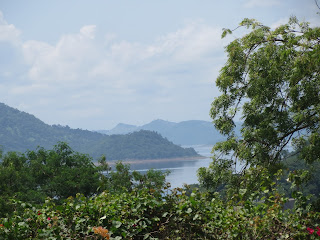It Is Coming
I think that I have mentioned before the problem with electricity here in Ghana. When we first got here we spent our first two nights and quite a few after that without any electricity hence no air conditioning and no fans either, of course. The Acosombo Dam, built in the 1960's, thanks to the USA, is not able to put out the capacity needed for a country that had five million people then and has 28 million people now. The government took no steps to prepare for the future and for the most part they still are not. Drought has also contributed to the lack of necessary water and Burkina Faso to the north has also restricted the flow of water into the Volta River.
 |
| The Acosombo Dam |
 |
| Northern part of the river. |
We have been in our "new" apartment since Thanksgiving. We have both electricity through Ghana Electric and when that is not working our complex has a diesel powered generator that switches on in a minute or two so we have never suffered like the average person that can't sleep at night because it's too hot or must get up in the middle of the night when the power comes on to do their ironing or wash the clothes for their laundry business and irritate the neighbors that are trying to sleep. Usually we have 12 hour shifts, alternating electricity and generator. Yesterday, 28 hours generator and less than 12 with electricity. You don't even want to know what the diesel bill is. Astronomical!
The lack of electricity is wrecking havoc with the entire country, personally and professionally. So many businesses have had to lay off employees because they have no electricity to run their business. Valco Aluminum Manufacturing could produce five lines of aluminum but has only been running one because there is not enough power and now we understand that they will be reducing staff because there is often not enough for even one line. It is so unfortunate.
The lack of electricity is wrecking havoc with the entire country, personally and professionally. So many businesses have had to lay off employees because they have no electricity to run their business. Valco Aluminum Manufacturing could produce five lines of aluminum but has only been running one because there is not enough power and now we understand that they will be reducing staff because there is often not enough for even one line. It is so unfortunate.
Help maybe on the way. Ghana is considering renting power ships. These are special purpose marine vehicles on which a power plant is installed as a short-term solution to solve the energy crisis. The government has requested two power ships from a Turkish energy producer. Instead of diesel power ships use heavy oil to generate electricity. The technology allows a station to operate for twelve hours a day in a twelve day cycle and, when out of power, draws energy from a ship moored next to it. The ships can be ready in 60 to 180 days and will need an onshore substation to feed the powership. Everyone is excited that by October the dumsor, lights out, will be over. However, they say that then we will have 80% of the necessary power. I sense a slight problem here...maybe it's just me. We shall see.



























































